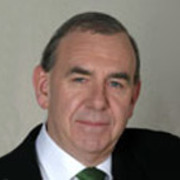
Ian Fraser
Ian Fraser became chief executive of Television New Zealand in 2002, but his association with television began long before that.
Fraser grew up in a Dunedin state housing suburb, during the baby boomer 50s. His father was an insurance assessor, his mother a hairdresser. The eldest of four sons, Ian was the only one who wasn't much good at sport. Instead he endeavoured to prove himself with his academic and musical prowess, having discovered classical music at a young age.
At Otago University, Fraser studied modern languages. At the age of 22 he left a potential career in academia and moved to Wellington to become an actor, including appearances at Downstage theatre. Later he swapped to journalism, having decided if offered more of an ethical dimension. This period also saw Fraser doing a spell as an executive for the performing arts, at the Queen Elizabeth II Arts Council.
Fraser got a job as anchor on Radio New Zealand's longrunning news programme Checkpoint, honing what he would come to call his own particular style of "performance journalism".
In 1974 Fraser began his first decade-long stint on television, initially as a reporter on current affairs show Nationwide, and later as a frontman and live interviewer. Seven Days, Sunday, Dateline Monday, and Newsmakers, which quickly saw promotion from a 5.30 Sunday to 9pm slot....the shows and interviews were many, and Fraser's interviewing style varied accordingly.
Sometimes he made a point of keeping subjects off balance through a series of quick fire questions - for example the interview with police minister Ben Couch five weeks before the start of the 1981 Springbok tour, during which Couch spoke of supporting apartheid. Other times Fraser took the charm offensive, as when an admiring note slipped under a hotel door helped him persuade interview-shy composer Leonard Bernstein (West Side Story) to temporarily relax his policy.
It was the hard interviews that won Fraser respect, and also disfavour — like when he asked the Shah of Iran what he was doing about his political prisoners. In the run-up to the 1984 election, prime minister Robert Muldoon refused to be interviewed by Fraser at all.
That year Fraser left television and joined public relations company Consultus, initially as an account director. There he worked on the introduction of Lotto, the selling of GST and the quickly forgotten 1984 Economic Summit. Fraser later admitted that in the end there can be no peace between journalism and public relations, with their differing aims.
Expo followed: Fraser was appointed Commissioner-General in charge of the New Zealand pavilions at world expos in Brisbane (1988) and Seville (1992).
In the 90s Ian Fraser returned to television: interview shows Fraser and Living Treasures, news programme Counterpoint, Rogernomics primer Revolution, and talent piece Showcase, where he finally got to demonstrate his piano-playing abilities. He also won critical praise for anchoring six straight hours of live coverage of the 1993 general election.
In 1998 Fraser left TVNZ to run the New Zealand Symphony Orchestra. Four years later, he was offered a three year contract doing what he called the only job that could have made him leave: Chief Executive of Television New Zealand.
During Fraser's time as chief executive, he appointed Bill Ralston as head of news and current affairs, and Tony Holden as head of commissioning chief. It was a challenging time to become chief executive, with TVNZ making the transition from a wholly commercial broadcaster to a public company, operating under a public broadcasting charter: ie being expected to deliver more New Zealand programming, while also delivering a profit.
"Under the Charter we will be driven by content considerations, where creative and cultural objectives are as highly valued as commercial ones," said Fraser in 2003. "We are constructing a home place for more New Zealanders, not an ivory tower for a few of them. But the Charter encourages us to invest in talent and imagination, to take creative risks and to provide a more diverse menu, particularly in prime time when most people are watching television."
Fraser resigned in October 2005, following a dispute with the TVNZ board over salary negotiations for senior staff. He went on to partner in public relations company Fraser Griffin Wood, alongside journalist Richard Griffin and public relations consultant Sue Wood (not to be confused with presenter Susan Wood).
In 2012 Fraser reunited with longtime friend John Clarke in Melbourne, where he interviewed the Fred Dagg star at a New Zealand Food and Grocery Council conference. The pair first worked together in the 1970s at the NZ Broadcasting Corporation, when Dagg would appear on Nationwide.
In 1990 Fraser was awarded an OBE for public service.
Profile updated on 22 June 2021
Sources include
Simon Beattie, 'Conducting a new direction' (Interview) - The Evening Post, 16 February 2002, page 25
Russell Brown, 'A fraction too much friction' - The Listener, 12 November 2005 (Volume 201 Number 3418)
Anthony Hubbard, 'The Serious Business of Showing Off' (Interview) - The Listener, 17 December 1990, page 12
Paul Smith, "Counter-Puncher' (Interview) - The Listener, 5 June 1993, page 38
'TVNZ Launches Its Public Broadcasting Charter' (Press release) TVNZ website (Broken link). Loaded 2003. Accessed 15 September 2011